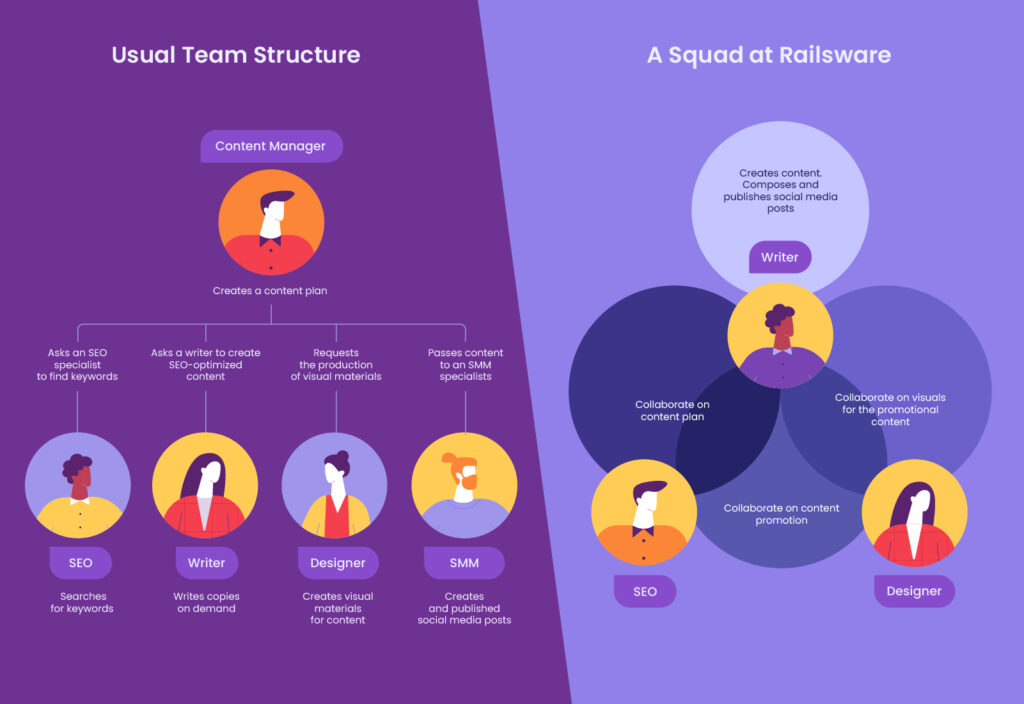
How we work at Railsware
Great specialists don’t always fit. To hire the right person that would blend in and start delivering immediately, we always keep in mind the peculiarities of our team and work processes.
- Flat organization. We don’t hire managers and avoid allocating managers at any cost. Every team member – outreacher, content writer, or marketing expert – is responsible for separate projects, not just for delivering materials or closing tasks.
- Senior level specialists. We only hire people who can manage themselves and deal with complex contexts. As a result, we get a direct impact from every team member on the accumulated success with zero babysitting. The ability to resolve blockers independently is the most common characteristic among Railswarians.
- Hands-on experts. As it’s said above, we avoid managers at the company, so everyone we hire is a hands-on expert in at least one context. For example, our PPC experts can write ads independently and shape landing page requirements while validating the product’s communication strategy.
- Pair and group collaboration. At Railsware, we work together quite a lot. We don’t just plan, strategize, or assign tasks in our meetings; we actually do work together. For example, an SEO expert can build a blog post’s outline together with a content writer, not just pass the task with requirements in Jira. Such cooperation makes everyone more efficient and the outcome more predictable as pair work enables instant and frequent feedback.
Skills and competencies we seek when hiring marketing specialists
There are hundreds of hard and soft skills a highly qualified marketing specialist should possess. Many of them are specific to each particular position, like editing for writers or negotiation for outreachers. However, there are foundational skills we want each marketing team member to have.
Ability to dig deep into a product
The simplest way to check if candidates can understand your product’s essence is to ask them to pitch their previous company. If they can’t “sell” something they worked with for a while, it’s very likely they won’t be able to pitch your product either.
Consciousness and empathy are critical soft skills for marketers. Not understanding a tiny piece of product or users’ behavior and aspirations will always lead to wrong marketing decisions and wasted time. In addition, Railsware mostly builds B2B tech products that solve complex and often abstract tasks. The number one goal for anyone joining the company is to understand the product and its audience. Why would you want to start doing it with someone who can’t explain clearly what their previous company was doing?
Sales skills
At this point, it’s easy to validate how candidates sell. We believe that all marketing specialists should have basic sales skills and understand the difference between:
- long and short sales cycles,
- inexpensive emotional and costly high-risk purchases,
- B2B, B2C, and even B2B2C sales.
For example, the decision to purchase a $4.99 MacOS productivity add-on will hugely differ from a decision to onboard your team of 150 people to the new project management platform. Marketers must clearly understand and feel the difference in sale cycles to build marketing campaigns that make sense.
Managing and self-managing skills
As mentioned before, we don’t hire managers to coordinate people. We only hire specialists with enough level of ownership to deliver results successfully and independently. Here’s an example.

The first image shows a typical team structure with a manager. For Railsware, this structure is disadvantageous as it often leads to a “bus driver effect.” This is when the one person that holds the context leaves the team or is temporarily unavailable, and the rest of the team gets blocked. Among other drawbacks of such a team structure is lack of knowledge sharing, inactiveness of the team members, and limited capacity of one person (manager).
In the second image, you see a scheme of a Railsware squad. There is no manager. Every squad member self-manages their own tasks and cooperates with others to get what they need from them. Not only can we learn from each other in such a team but also work independently, holding responsibility for our decisions and the project outcome. What’s more, we rarely get blocked.
One more unobvious benefit of squad collaboration is a significant rise in quality. In the first manager-led scenario, the quality depends on one person. A manager has to give feedback to writers, designers, and SEOs. In the second case, everyone shares feedback from different points of view, which leads to improving the final outcome.
Writing skills
Writing is the foundation of marketing. Put simply, you can’t sell without words, and you need someone to put those words around your product together. A PPC expert who can’t craft a creative ad without a copywriter is permanently blocked. An SEO expert who can’t compose a headline is doomed to constantly fight with a writer in a battle of Keywords vs. Creativity. A marketing generalist who can’t write at least an email or a sales pitch will never make any progress on your project. So, if you can hire only one specialist for your business, go for a writer or someone who can write. Together you can hit the ground running.
As your team grows, you will hire more focused and niche experts; probably not all of them will be fans of copywriting, which is also fine. But even in this case, always try to keep the balance of writers and non-writers in your team in order not to overwhelm writers with cluttered tasks.
Craft thinking
The road to mediocrity is paved with the best practices. You need to craft constantly. At Railsware, we heavily rely on industry and community knowledge. However, every time we start a new marketing campaign, we dig into the context to investigate potential benefits, risks, issues, and domain knowledge, and after that, we craft absolutely custom and unique solutions. Often, we develop our own frameworks and approaches as a result. This is how Railsware created BRIDGeS – a decision-making framework that can be a perfect tool for marketing ideation and roadmap planning.
When interviewing a candidate, we check how a person can focus on solving custom challenges, not implementing typical marketing approaches. Creating a ton of SEO-optimized content, spending thousands of dollars on paid ads, or writing landing page copies isn’t that difficult. Understanding how all this can boost your business growth is super hard and must be questioned by Marketers regularly.
What is the process?
The hiring process of a marketing specialist at Railsware doesn’t differ much from the hiring process of a developer or a designer. We strongly believe in the power of collaboration, pair, and group work. Especially with such a deep experience in pair programming as we have. This is why collaboration is the core of our whole hiring process.
Intro call
During this first interaction, we want to know about the candidate’s experience, motivation, and job expectations. Also, this is a perfect time and place for candidates to ask questions about our team, processes, or anything else they are interested in.
Test task
For a marketing position, we always ask candidates to complete a test task to check their knowledge. A test task also allows a candidate to navigate through the context of a marketing project, which is essential for further collaboration sessions. After the test task, we spend less time explaining the product and the market to the candidate, as they have already had some time to prepare and now can demonstrate all their strengths.
Railsware Pair Interview
During this interview that goes beyond discussing a resume, a candidate collaborates with a Railswarian to complete several hands-on tasks that would be typical for this position. For instance, with content writers, we collaborate on several different copies, such as a short social media post, job description, or blog post paragraph.
This way, we simulate future work so that both sides can understand if it’s a good match.
Full day and job offer
If the pair session went well, a candidate is then invited for a Full Day of collaboration with a team. This last step helps a candidate to feel what their usual work day would look like, whom they will be working with, and how. For example, with marketers, we can collaborate on different parts of a marketing strategy, such as positioning or branding. Or we can define an ideal customer profile for a certain product among several options. We never simplify contexts or simulate the situations during the Full Day. We actually share the projects we are currently working on to understand how deep we can dive together with a candidate during the day.
By the end of the Full Day, we share our final decision and send candidates a job offer. In case of a negative decision, we provide comprehensive feedback to help a candidate improve their soft spots and get back to us in the future.
A typical work day at Railsware
Many candidates ask us what a typical work day at Railsware looks like. The short answer would be: Railswarians divide their time between hands-on tasks (about 70%) and vision contribution (30%).
The long answer is a bit more complex. The thing is, we don’t provide Railswarians with a strict list of their tasks and responsibilities. When they join the company and the product, we share strategic vision and goals for both without putting newcomers on the rails and shaping their roadmap. We understand how each candidate can enhance our team and expect them to help us in these directions. But we also expect people to contribute with their unique experiences, passion, or willingness to learn.
After onboarding, newcomers share their understanding of how they can contribute and shape a roadmap based on their experience, skills, and interests. We only help them to align their activities with long-term goals and provide them with the needed support.
Sounds cool? Check the list of our open positions and apply!